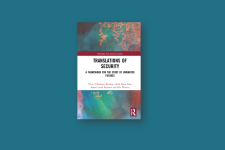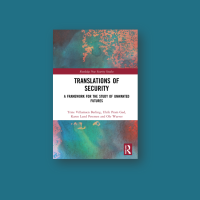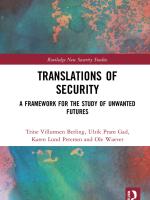Translations of Security - a framework for the study of unwanted futures

When the covid-19 pandemic hit and countries around the world shut their borders and went into lockdown, a long underway development was suddenly very clear: the security threats we face today escape traditional national and professional boundaries. What used to be a matter for the military and security services is now dealt with by a plethora of actors: doctors, nurses, mathematicians, and even private companies step in and acquire the authority to define and implement measures to bolster national and global security.
At the same time, different national cultures understand central concepts such as risk and precaution in contradictory ways. Is it wise to wear a mask? Should we close the national border to avoid influx of corona cases? On what evidence and on who’s authority should we act? In the process, the individual is called upon to take societal responsibility. It no longer suffices to cast your vote in recurring elections. With the corona pandemic, the individual has become the last frontier in the protection of the state. Protesting corona measures is translated into treason or madness in neighbouring countries that used to consider themselves alike. Take Sweden and Denmark as an example.
In this cacophony of translations of security we need new analytical tools to grapple with key societal clashlines. How can we understand this development? What does it mean for the authority of the state? For the trust in knowledge?
Translations of Security offers an analytical lens to filter through current politics of bad futures and gives a systematic approach to a chaotic time. By including short empirical examples of translations by a number of authors in international security studies, the book tackles the issue of translations in areas such as the Artic, Cuba, Afghanistan, and the US, while also zooming in on different professions’ way of dealing with danger, risk, and uncertainty, and translations tied to so-called super-empowered individuals and terrorist networks.
The book will be of interest to professional analysts, students, and anyone wanting to take a step back and seek to understand The time of Translations.
DIIS Eksperter



